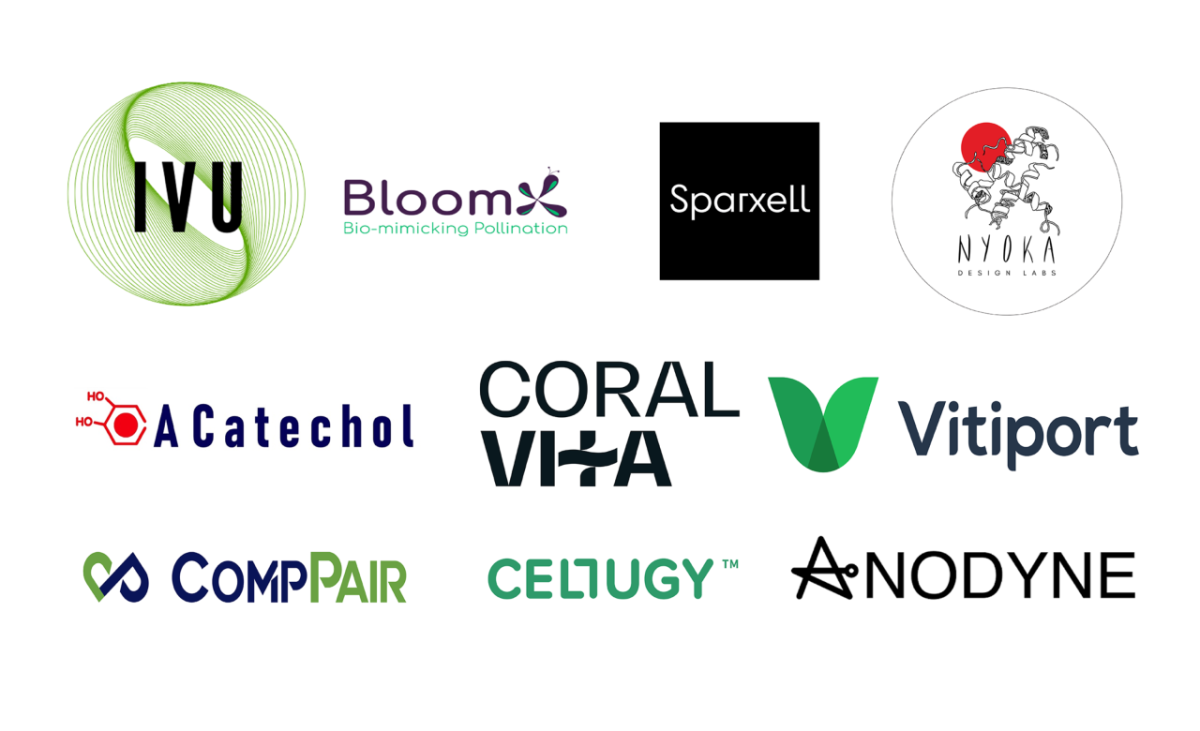Meet 2023's Top 10 Nature-Inspired Startups Solving Crucial Environmental and Social Problems
Biomimicry Institute announces new cohort of bioinspired startups participating in the Ray of Hope Prize ® program.

August 17, 2023 /3BL/ - From inventing healable composites to reduce waste, to supporting agricultural yields from the soil to the pollinators, to the creation of sustainable and safe pigments that color our world, the 2023 Ray of Hope Prize® finalists offer inspiring solutions through their use of biomimicry (also referred to as nature-inspired or bioinspired design). Selected from hundreds of impressive submissions from companies around the world, the Biomimicry Institute is proud to announce the top 10 finalists selected to participate in this transformational program designed to help startups cross a critical threshold in scaling their sustainable solutions. The 10-week virtual accelerator program culminates in the chance to receive the $100,000 grand prize and additional equity-free funding.
“Every year I am blown away by the diversity of sectors, individuals and countries represented in the top 10 finalists of the Ray of Hope Prize,” said Dr. Sarah McInerney, Program Manager at the Institute. “This year's cohort represents eight different countries, has an even split of female to male representation on their founding teams and are all working in different sectors. It is this type of diversity of action and thought that we need to tackle our current climate challenges to realize a more sustainable and biodiverse future.”
The 10 participating companies include:
ACatechol, Inc. United States
ACatechol develops surface-coating technologies inspired by marine sessile organisms, such as mussels, for biomedical applications and to prevent hospital-acquired infections.
Anodyne Chemistries Canada
Anodyne Chemistries uses nature’s catalysts, enzymes, to solve the chemical industry’s addiction to fossil fuels, replacing high temperature petrochemistry with a sustainable bioelectric process.
BloomX Israel
BloomX’s technology couples predictive algorithms with advanced, crop-specific robotic tools replicating the way pollination is done in nature to sustainably increase crop yield and quality, while lowering the environmental footprint.
Cellugy Spain
Cellugy is unleashing the potential of bio-fabricated cellulose to create consumer goods that enable a healthy planet, challenging the need for petrochemicals in our everyday products.
CompPair Technologies Switzerland
CompPair builds healable and sustainable composite materials to extend the lifetime of products while reducing waste.
Coral Vita United States
Coral Vita grows climate change resilient coral up to 50x faster via a natural process known as micro-fragmentation, while deploying a commercial model to restore dying reefs at scale.
Ivu Biologics Inc United States
Ivu Biologics has developed a nature-inspired solution that protects most microbes from drying out and dying, enabling their expanded use as a seed treatment to lower water, fertilization, and pesticide usage.
Nyoka Design Corp Canada
Nyoka's breakthrough bioluminescent-mimicking technology generates stable, safe, sustainable light for over 48 hours and is positioned to replace millions of tons of single-use plastic and carcinogenic waste from the chemiluminescence industry.
Sparxell United Kingdom
Sparxell creates the next generation of colors and effects with vibrant, metal-like pigments, all from plant-based cellulose.
Vitiport Slovakia
Vitiport has developed a globally unique type of marking pheromones that prevent pests from laying eggs on crops, without using toxins, and bringing to life a new market category in crop protection.
The Ray of Hope Prize participants will now begin the 10-week virtual program and will be delivering their pitches for the $100,000 top prize to an expert judging panel in November. During this program, the Institute will help these startups scale more quickly in order to compete in multi-billion dollar, extractive industries; avoid the common push to produce products cheaply, leading to further (unintentional) harm (such as the use of toxic chemicals); and help them to easily communicate their science and application of biomimicry. The program includes an immersive retreat in the awe inspiring Yosemite National Park for participants to reconnect with the natural world and form bonds with their fellow bioinspired innovators.
“We are thrilled to be supporting Biomimicry through the Ray of Hope Prize, and it is truly inspiring to see this latest cohort of innovators and changemakers. Their dedication to creating and scaling nature-inspired solutions aligns perfectly with our Foundation’s mission, and we are excited to see their impactful solutions contribute to addressing today’s most pressing environmental challenges.” Christoph Hohmann, Head of the Bentley Environmental Foundation.
“This year’s Ray of Hope Prize finalists give me hope for a more vibrant, sustainable, biodiverse world,” said Jared Yarnall-Shane, Director of Innovation at the Institute. “We look forward to supporting these brilliant entrepreneurs and scientists so that they will thrive long into the future.”
Previous Ray of Hope Prize finalists include breakthrough innovators such as GreenPod Labs, Spintex Engineering, ECOncrete, Biohm, Werewool, Spotless Materials, Impossible Materials and many more. These companies have gone on to raise millions more in seed funding and have made inspiring impacts to the industries they’ve designed solutions for.
For more information about the Ray of Hope Prize and how to support the Institute’s nature-inspired design innovation initiative, visit www.biomimicry.org/rayofhopeprize.
About the Biomimicry Institute
The Biomimicry Institute is a 501(c)(3) not-for-profit organization founded in 2006 that empowers people to seek nature-inspired solutions for a healthy planet. To advance the solution process, the Institute offers AskNature.org, a free online tool that contains strategies found in nature and examples of ways they are used in design. It also hosts a Youth Design Challenge to support project-based education; a Biomimicry Launchpad startup accelerator program; and the Ray of Hope Prize® for early-stage biomimetic companies to bring solutions to market. The Institute’s collaborative initiative, Design for Decomposition, pilots technologies that convert discarded clothes and textiles into biocompatible raw materials. The Ray of Hope Prize is made possible due to the support of our founding partner the Ray C. Anderson Foundation and our partners at the Bentley Environmental Foundation, and L’Oréal. For more information, visit biomimicry.org.
Media Contact
Marc Cappelletti, Director of Marketing and Outreach
marc.cappelletti@biomimicry.org
415-800-1361

